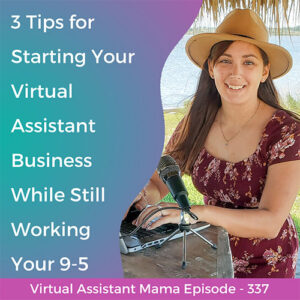
Episode 337: 3 Tips for Starting Your Virtual Assistant Business While Still Working Your 9-5
In this episode of the Virtual Assistant Mama podcast, I’m sharing 3 tips to help you start your Virtual Assistant business while still working your 9-5.
In today’s episode of the Ditch the Classroom podcast, I’m sharing how you can use your Virtual Assistant business to pay off debt, whether it’s student loans, your mortgage, or any other debt hanging over your shoulders.
I’ll be sharing my 3 tips for how my husband and I were able to pay off over $40k in student loans, and how you can too.
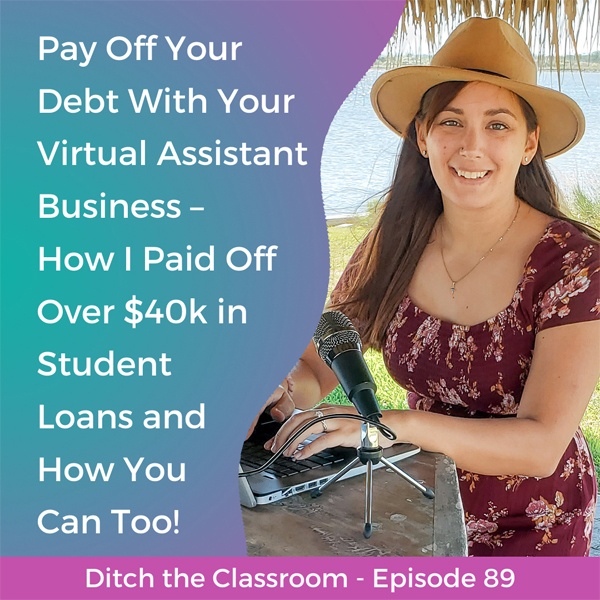
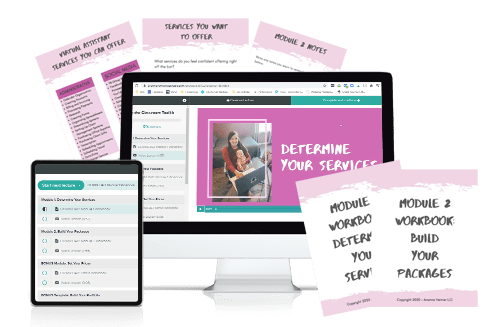
Grab your Ditch the Classroom Toolkit for only $47!
Sign up for the free Virtual Assistant Workshop, the Ditch the Classroom Toolkit, or Teacher Turned Freelancer Academy.
Have any questions for me? Feel free to send me an email at arianna@ariannavernier.com or on Instagram @arianna.vernier! I love chatting with y’all and helping you hit the ground running. Are you ready? Let’s go.
Love,
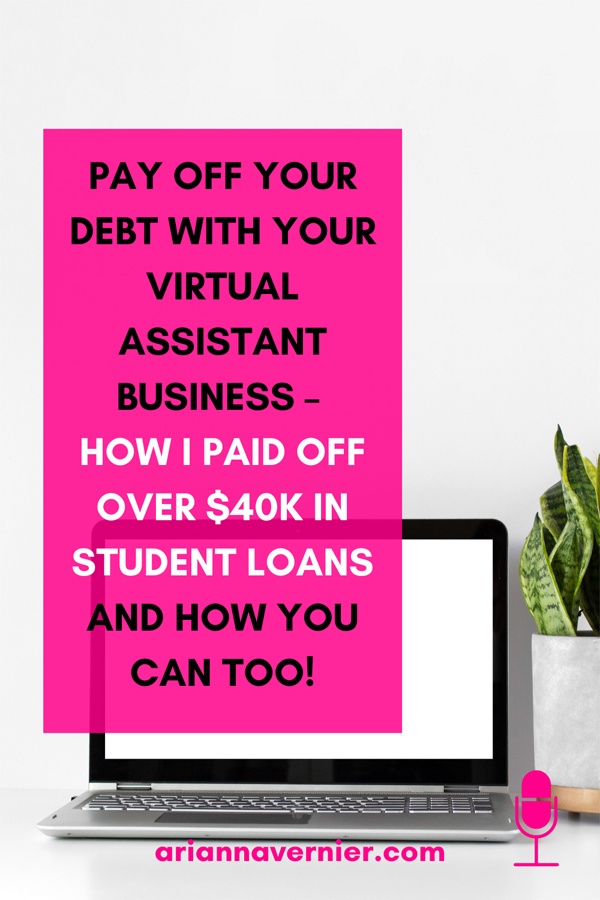
Full Episode Transcription:
Hello everyone. Welcome back to the Ditch the Classroom podcast. Before we jump into today’s episode, I just wanna let y’all know. I know that a lot of, you know, I live full-time in an RV and my walls are thin and it’s spring and the birds are singing. So if you hear a little bit of song in the background, that is why. They’re quite loud this morning. But in today’s episode, I’m gonna be sharing with you how my husband and I were able to pay off just over $40,000 in student loans, because of my virtual assistant business. I shared this in the Facebook community and celebrated with y’all. And a lot of you asked how we were able to do that, how we kind of structured our finances and how we were able to save that much and pay it all off. So today I’m gonna kind of give you that breakdown and show you how you can do it too.
(01:45):
So point number one is to live under your means. We sold our house back last January, and we ended up going tiny living in our RV. And that’s a little bit of a dramatic living below your means, but where can you find in your budget that you don’t need to be spending that much? Maybe your maximum on a car payment is 500. Maybe you don’t need to spend the max on that. Maybe you just need to look for a car payment that’s 300. Where can you cut back on some of your spending and live below your max? So we structured it so that we only live off of what my husband’s income is. And then all of my income from my business was thrown into either savings or our debt. Okay. So if you can structure it that way, that’s a really good way to start paying off your loans.
(02:48):
And I will say, if you wanna go dramatic, like we are and go tiny living and sell your house, it’s way more fun than I expected. Winter was a little bit interesting because we were kind of stuck in this very small area. But now that it’s getting nice again, and we can go outside and have campfires and just be outside as a family. It is so much fun. We’ve been tiny living for a year now with three cats, a dog, my husband, myself, and now two kiddos, a two-and-a-half year old and a newborn. And I love it. And I don’t know when we’re gonna stop doing this because it’s so much fun. So if you thought about tiny living, that is a great way to pay off your student loans.
(03:33):
All right. So number two is to have a budget. I know this kind of goes with living under your means. Don’t spend as much as you make. But in order to do that, you have to know where your money is going. And so very early on in our marriage, we set up a budget. And before we got married, I had a very basic budget when it was just my income alone, but I was always overspending. I never really knew how much I had to spend in categories. Like I allotted it there, but then I still didn’t really pay attention and overspent in those categories. And so now with the budget that my husband set up, we can see line item for line item, what we’re spending, where, and it really holds us accountable to not overspend because the columns turn red when they’re negative, which you’re like, oh shit, I guess I can’t spend anymore there for the month until we get more income in that category.
(04:34):
And so that has been very, very helpful to have that budget and actually use it to hold us accountable. If you have a budget and then you never look at it, it’s not going to help you. So we made it a routine to go in every week and put in what we’ve spent in each category. And then really try to check it before we’re gonna go, you know, buy clothes for ourselves or do some big spending. We go and look at the categories and make sure we’re not gonna be overspending. And we actually know where our money is and what we have the ability to spend. So stick to a budget. That has been a game changer in helping us save this money and not overspend in the other categories and have to pull from the money we were saving to pay off debt.
(05:23):
Number three, I’m sure y’all have heard this before is the snowball effect. So this is by Dave Ramsey, but it’s basically where you pay off your smallest loan as fast as possible. And then once you’ve paid off that smallest loan, you take that money and put it towards the next smallest. And then you take that money and put it towards the next smallest and you keep going and it snowballs ’til you’re making a huge payment towards your last biggest loan and it’s gone a lot faster. This is where living under your means and budgeting compile to allow you to snowball effect, because if you’re living under your means, you have more money to throw at the loans. You’re not stretched to your max and only able to make the smallest payments. But if you are stretched the max and only able to make the smallest payment focus on that smallest loan, get it out of the way.
(06:20):
And then don’t start spending that smallest loan money elsewhere, throw it at the next one. And you’ll really – you’ll be inspired by how quickly you’re able to pay off that smallest one. And that really pushes you to want to pay more on the others and get it all gone. Because once it’s all gone – I can speak from experience now – we’ve been out of debt for about a month. It is such an amazing feeling to know that our money can go what we want it to go towards. And I want all of y’all to be able to do that too. So if you can use these three tips to really just help you take baby steps, you don’t have to go crazy and sell your entire house. Like we did. We just really were done. We were done having all of this hanging over us and we want to live like no one else right now.
(07:14):
So we can live like no one else later. And yeah, just live the life we wanna live and not have this debt hanging over us for the next 20, 30 years. So now with that money that we were throwing at loans, now we can save for a house and we hopefully won’t have to take out that big of a mortgage for a house. So this is all just to show you that you can do this too. It’s just about taking those baby steps. Don’t feel like, you know, you’re stuck and you can’t do anything. You can even, like I said, even if your budget is stretched to the max and you’re only making those minimum payments, throw it at your smallest loan and you can see how it will start to snowball like Dave Ramsey teaches.
(08:05):
Okay. So those three tips that I gave you were live under your means, use a budget and stick to it, check it every week, make sure you’re not overspending in categories. And then do the snowball effect by Dave Ramsey. So those are the three things that really allowed us to pay off our debt. And I also forgot to mention, I know right now when this episode is coming out, the student loan payments have been paused. And so for us that allowed us to really save that money that we were making in minimum payments. We just kept putting it in the student loan debt category of our budget. And then we were able to throw it all at the student loans at once. But if you can’t do that, keep making those minimum payments, but throw extra money into those payments when you can. You don’t have to pay it off all at once like we did. We only did that because the student loan payments have been paused for quite a while because of what’s going on in the world right now.
(09:06):
All right. So again, just to recap, live under your means. Budget. Snowball effect. This – you’ll see that these baby steps will help you so much in getting that debt off of your shoulders. All right. I hope that this was helpful for y’all and inspiring for y’all. If you’ve been loving this show, please make sure you go and leave a review. This is what helps the podcast grow, reach more mamas and teachers. It blesses me so much. I would be so incredibly grateful. All you have to do is go to Apple Podcasts, scroll down on my show, click the rating and you can leave five stars and then write a couple sentence review. It makes me so incredibly happy to see you guys loving this show and that the time and energy I pour into this is helping y’all. All right. I love you so much and we will see you next episode.

In this episode of the Virtual Assistant Mama podcast, I’m sharing 3 tips to help you start your Virtual Assistant business while still working your 9-5.
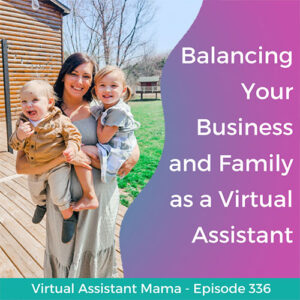
In this episode of the Virtual Assistant Mama podcast, I’m sharing how to balance your business and family life as a Virtual Assistant.
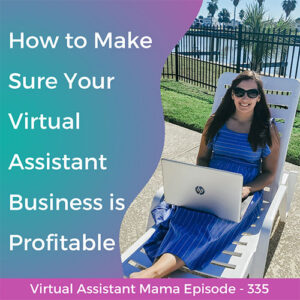
In this episode of the Virtual Assistant Mama podcast, I’m sharing how to make sure your Virtual Assistant business is profitable.